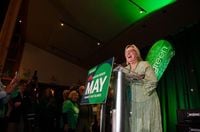In a remarkable display of resilience, Green Party co-leader Elizabeth May has been re-elected to her Vancouver Island seat of Saanich-Gulf Islands during the federal election held on April 28, 2025. May, who has represented the riding since 2011, triumphed over Liberal candidate David Beckham and Conservative contender Cathie Ounsted, while the NDP's Colin Plant finished a distant fourth.
May's victory speech, delivered at the Green Party campaign headquarters in Central Saanich, was filled with gratitude towards her supporters and the 250 volunteers who worked tirelessly on her campaign. "It was a hard election, and my win is based on the devotion and commitment of my team," she stated. Despite the intense media speculation suggesting a potential loss, May managed to secure her position with approximately 40 percent of the vote, a significant achievement in a race that many had labeled as a toss-up.
Mark Carney, the newly elected Liberal Prime Minister, congratulated May on her victory, expressing his anticipation of working together in the House of Commons. Carney noted the importance of having "seasoned knowledgeable leadership in the house," which May embodies through her extensive political experience.
Reflecting on her campaign, May emphasized that it was her grassroots efforts—particularly door-to-door canvassing—that ultimately led to her success. She remarked, "The reason we were successful here … was from the devotion and commitment of volunteers." This sentiment resonates with her history in the riding, where she first made headlines in 2011 by becoming the first Green Party member elected to federal office.
However, the election results were bittersweet for the Green Party, as May's victory was overshadowed by the loss of her co-leader, Jonathan Pedneault, in the Montreal riding of Outremont. Pedneault's defeat was partly attributed to the last-minute withdrawal of the Green Party from the English-language leaders' debate, an event that May criticized as "extremely anti-democratic." She noted that this decision significantly impacted the party's overall performance, leading to a dramatic drop in their popular vote share.
The Green Party's support has dwindled in recent years, falling from a peak of 6.55 percent of the popular vote in 2019 to just 1 percent in this election. May's win stands out in an election where the party struggled to maintain its footing amid a Liberal resurgence that has largely come at the expense of other progressive parties.
In her victory address, May also outlined her priorities moving forward, stating that her first order of business would be to stand up to U.S. President Donald Trump. "Job one is Team Canada. Pushing back on Trump, protecting our economy and making sure we have economic sovereignty over our own resources to protect Canadian jobs," she declared passionately.
As May prepares to return to Parliament, she has made it clear that the Green Party will continue to advocate for environmental issues while also expanding their platform to include broader economic policies. "If anyone looked at our platform in this election … we have the most innovative ideas for economic sovereignty," she asserted. This commitment to a more comprehensive approach may be crucial for the party's future viability in Canadian politics.
Despite the challenges faced by the Green Party, May remains optimistic about her role in a minority government. "I'm very pleased that we're going to play a role in a minority parliament. In a majority situation, we'd have much less chance to make a difference," she noted, highlighting the opportunities that exist for collaboration across party lines.
As the dust settles on the election, May's supporters are rallying around her leadership, expressing confidence in her ability to navigate the complexities of a divided Parliament. Volunteer Jim Hesser remarked, "We’ve heard time and time again about how much [May's] constituents love her and appreciate how hard she’s worked." This sentiment reflects the deep connection she has forged with her community over the years.
Meanwhile, the political landscape in Canada continues to evolve, with Prime Minister Carney vowing to govern for all Canadians, regardless of their political alignment. In his victory speech, Carney acknowledged the close race with the Conservatives and emphasized the importance of humility in leadership. "I promise to own up to and learn from the mistakes I have and expect to make in this new role," he stated, signaling a commitment to inclusivity and collaboration.
As for the Conservative Party, leader Pierre Poilievre faced a surprising defeat in his long-held Carleton riding, losing to Liberal Bruce Fanjoy. Poilievre's loss, combined with the Green Party's challenges, reflects a shifting political dynamic in Canada, where traditional party loyalties are being tested.
In summary, Elizabeth May's re-election marks a significant moment for the Green Party amidst a tumultuous election cycle. Her ability to rally support in Saanich-Gulf Islands demonstrates the enduring appeal of her leadership, even as the party grapples with broader electoral challenges. As the new Parliament convenes, all eyes will be on May and her colleagues to see how they navigate the complexities of a minority government and continue to advocate for their platform in a changing political landscape.






